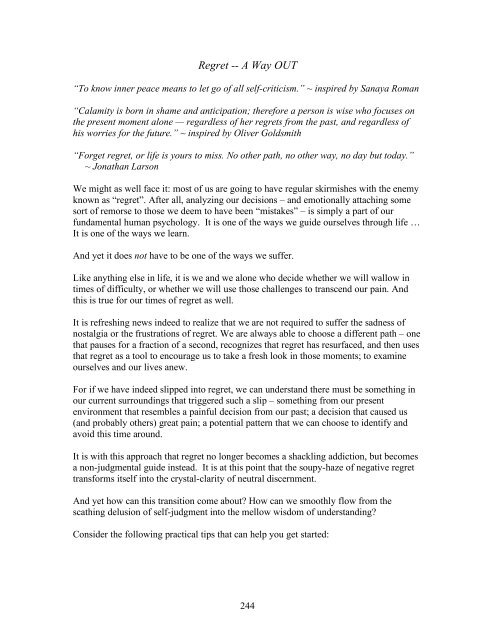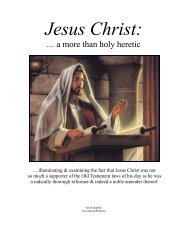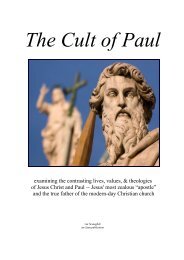- Page 1 and 2:
LICKING the RAZOR’S EDGE Recogniz
- Page 3 and 4:
inspired by … & in honor of Todd
- Page 5 and 6:
Introduction Over the course of my
- Page 7 and 8:
“There are all kinds of addicts
- Page 9 and 10:
And yet, if you make sure your ego
- Page 11 and 12:
Addiction #01 - Freedom from ALCOHO
- Page 13 and 14:
Alcohol -- A Way OUT “I can’t c
- Page 15 and 16:
Addiction #02 - Freedom from SMOKIN
- Page 17 and 18:
And here is the point that is more
- Page 19 and 20:
That means that in only 3 weeks, th
- Page 21 and 22:
TIP #10 - TREAT YOURSELF Giving up
- Page 23 and 24:
Addiction #03 - Freedom from CAFFEI
- Page 25 and 26:
MYTH #05 - Caffeine (specifically c
- Page 27 and 28:
*And finally, and by far MOST IMPOR
- Page 29 and 30:
Addiction #04 - Freedom from SUGAR
- Page 31 and 32:
Sugar -- A Way OUT “Foods high in
- Page 33 and 34:
Addiction #05 - Freedom from MEAT
- Page 35 and 36:
In addition, even though we have ev
- Page 37 and 38:
In addition, these animals are sent
- Page 39 and 40:
Effect #05 - Most importantly of al
- Page 41 and 42:
*Many known cancer-causing ingredie
- Page 43 and 44:
*Also, a study in the Wall Street J
- Page 45 and 46:
Addiction #08 - Freedom from SALT
- Page 47 and 48:
Addiction #09 - Freedom from GMO’
- Page 49 and 50:
TIP #02 … READ your LABELS You mi
- Page 51 and 52:
Addiction #10 - Freedom from Glutto
- Page 53 and 54:
Maybe you are “walking on eggshel
- Page 55 and 56:
Gluttony -- A Way OUT “My doctor
- Page 57 and 58:
TIP #07 - REMEMBER THE WHY of your
- Page 59 and 60:
Of course, your own level of “hoa
- Page 61 and 62:
THE CONSEQUENCES of HOARDING Hoardi
- Page 63 and 64:
TIP #02 - PILING IT UP Designate an
- Page 65 and 66:
Finally, regardless of how you deal
- Page 67 and 68:
Most importantly of all, almost now
- Page 69 and 70:
*Casual sex creates a void between
- Page 71 and 72:
In everything we do, it is the “w
- Page 73 and 74:
TIP #07 - LIMIT YOUR FREQUENCY The
- Page 75 and 76:
While the existence of such a dysfu
- Page 77 and 78:
THE CONSEQUENCES OF BEING ADDICTED
- Page 79 and 80:
*Do you provoke arguments? Do you r
- Page 81 and 82:
LOVE ADDICTION: A POWER-FULL SOLUTI
- Page 83 and 84:
*According to another study of wome
- Page 85 and 86:
While the pages that follow will go
- Page 87 and 88:
Start by taking a long and deep loo
- Page 89 and 90:
Practical TIP #03 - SEEING THE SELF
- Page 91 and 92:
As long as you are attempting to ma
- Page 93 and 94:
Practical TIP #06 - The TRUE BEAUTY
- Page 95 and 96:
Practical TIP #07 — CHOOSING REVE
- Page 97 and 98:
And yet, despite the evidence that
- Page 99 and 100:
Comfort -- A Way OUT “It is not t
- Page 101 and 102:
Well, my Friends, there is no guara
- Page 103 and 104:
And so we log on again … and agai
- Page 105 and 106:
In the pages that follow I will des
- Page 107 and 108:
*When you feel the urge to log-on
- Page 109 and 110:
*Do you analyze, criticize or other
- Page 111 and 112:
*TRUTH #03: Vacant TALKING MEANS NO
- Page 113 and 114:
The pains of our past are our most
- Page 115 and 116:
Addiction #18 - Freedom from TV “
- Page 117 and 118:
And yet there are other negative co
- Page 119 and 120:
*Watching Television causes a LOSS
- Page 121 and 122:
*Do you use your TV as a baby-sitte
- Page 123 and 124:
TIP #03: LIMIT YOUR VIEWING … Onl
- Page 125 and 126:
Addiction #19 - Freedom from VIDEO
- Page 127 and 128:
*VIDEO GAMES are SOCIALLY ADDICTIVE
- Page 129 and 130:
RECOGNIZING YOUR OWN GAMING ADDICTI
- Page 131 and 132:
Addiction #20 - Freedom from SLOTH
- Page 133 and 134:
*We are EMOTIONALLY CONDITIONED to
- Page 135 and 136:
The Power-full Alternative: BUILDIN
- Page 137 and 138:
TIP #18: BE A “GOOD NEIGHBOR”
- Page 139 and 140:
The CONSEQUENCES of “PRODUCTIVITY
- Page 141 and 142:
*Do you regularly feel like you nee
- Page 143 and 144:
Productivity -- A Way OUT “The qu
- Page 145 and 146:
Essentially, when we follow this gu
- Page 147 and 148:
Addiction #22 - Freedom from THINKI
- Page 149 and 150:
*Do you replay recent conversations
- Page 151 and 152:
Avoiding COMMON TRAPS & “Fake Sol
- Page 153 and 154:
Please note that this chapter in no
- Page 155 and 156:
So, erring on the side of seeing th
- Page 157 and 158:
We have tried “change from the to
- Page 159 and 160:
We are told over & over again that
- Page 161 and 162:
The CONSEQUENCES of SERIOUSNESS The
- Page 163 and 164:
Saddened by the news? Shrug, sigh a
- Page 165 and 166:
Addiction #25 - Freedom from NEGATI
- Page 167 and 168:
*Negativity intensifies what psycho
- Page 169 and 170:
Because we are more than our “rep
- Page 171 and 172:
*TIP #02: REMAIN in the MOMENT …
- Page 173 and 174:
Addiction #26 - Freedom from CALLOU
- Page 175 and 176:
The SOURCE of the ADDICTION Almost
- Page 177 and 178:
*CALLOUSNESS INFLICTS “KARMIC SPL
- Page 179 and 180:
Tip #02: FORGIVE, FORGIVE, FORGIVE
- Page 181 and 182:
Addiction #27 - Freedom from ARROGA
- Page 183 and 184:
*Do you believe that you have a rig
- Page 185 and 186:
We are arrogant in relation to our
- Page 187 and 188:
“We can never accurately judge th
- Page 189 and 190:
TIP #02: DEFEND THE DEFENSELESS …
- Page 191 and 192:
TIP #04: BE KIND to your CRITICS
- Page 193 and 194: TIP #06: LISTEN, LISTEN, LISTEN …
- Page 195 and 196: TIP #08: OPEN the MIND = OPEN the H
- Page 197 and 198: BENEFIT #01: ENHANCED AWARENESS OF
- Page 199 and 200: Addiction #28 - Freedom from CONFLI
- Page 201 and 202: *Do you think that you can alter ot
- Page 203 and 204: The CONSEQUENCES of our CONFLICT AD
- Page 205 and 206: Conflict -- A Way OUT “Peace is n
- Page 207 and 208: Peace-full Way #03: FORGIVENESS CAR
- Page 209 and 210: RECOGNIZING YOUR OWN ADDICTION to I
- Page 211 and 212: What is especially interesting, at
- Page 213 and 214: HARM #02: INFORMATION ADDICTION INS
- Page 215 and 216: TIP #01 (& tip “only”): TURN OF
- Page 217 and 218: Addiction #30 - Freedom from NORMAL
- Page 219 and 220: *Do you get your hair done at a sal
- Page 221 and 222: It is only one example among many,
- Page 223 and 224: There are quite a few preachers and
- Page 225 and 226: Addiction #31 - Freedom from RELIGI
- Page 227 and 228: *Do you preach Kindness and moralit
- Page 229 and 230: In essence, the questions that you
- Page 231 and 232: TIP #02: LOVE YOUR ENEMIES … It i
- Page 233 and 234: Addiction #32 - Freedom from ENVY
- Page 235 and 236: *Do you tease others about their ad
- Page 237 and 238: #02) ENVY SOLIDIFIES SADNESS … De
- Page 239 and 240: I don’t have any specific advice
- Page 241 and 242: *After discovering that you have ac
- Page 243: The CONSEQUENCES of REGRET When lef
- Page 247 and 248: In conclusion, then, dealing with r
- Page 249 and 250: And then when things are going well
- Page 251 and 252: RECOGNIZING our ADDICTION to SADNES
- Page 253 and 254: “You can’t keep the birds of sa
- Page 255 and 256: PRACTICAL TIPS for BRINGING the BLI
- Page 257 and 258: And yet, as with every other addict
- Page 259 and 260: *Do you pry into the affairs of oth
- Page 261 and 262: Fear -- A Way OUT Step 01: RELEASE
- Page 263 and 264: Note here that I am not intending t
- Page 265 and 266: Step 03: FORGIVE (the verb) “Hold
- Page 267 and 268: I realize that to judge another per
- Page 269 and 270: Step 05: PROTEST INJUSTICE “For t
- Page 271 and 272: *Instead of marching on the White H
- Page 273 and 274: Consider: It is our fear that gives
- Page 275 and 276: That being said, this thin fog of f
- Page 277 and 278: Even so, many of you are probably q
- Page 279 and 280: Consider the following oft-forgotte
- Page 281 and 282: *So don’t get angry at your ego f
- Page 283 and 284: Indeed, it is time for us to rememb
- Page 285 and 286: It is important to remember - espec
- Page 287 and 288: FREEDOM from addiction IS INSTANTAN
- Page 289 and 290: Step 02) CONSOLE your Ego … Have
- Page 291 and 292: The more often you do so - the more


















